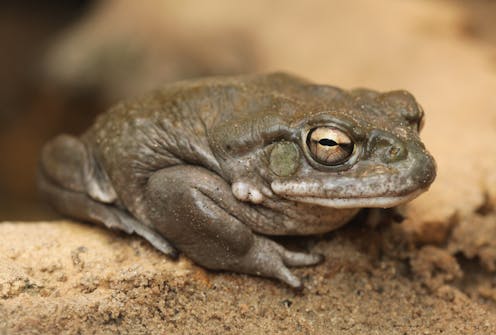wildlife traded on the dark web is the kind that gets you high
- Written by Phill Cassey, Head, Department of Ecology & Evolutionary Biology, University of Adelaide

The internet has made it easier for people to buy and sell a huge variety of wildlife – from orchids, cacti and fungi to thousands of birds, mammals, reptiles, amphibians and fish, as well as insects, corals and other invertebrates.
But alongside legal trade in wildlife, there’s a dark twin – illegal trading of wildlife. Endangered birds with very few left in the wild. Horns sawn off shot rhinos. The illegal wildlife trade is a blight. It puts yet more pressure on nature, adds to biodiversity loss and threatens biosecurity, sustainable development and human wellbeing globally[1].
In our new research[2], we probed the dark web – the secretive section of the internet deliberately set up out of view of search engines. Most people associate the dark web with illicit drug marketplaces. We wanted to see what types of wildlife were being sold there.
The result? Across 51 dark web marketplaces, we found 153 species being sold. These were almost entirely plants and fungi with psychoactive effects, indicating they are part of the well-known dark web drug trade. There were only a small number of advertisements offering vertebrates such as the infamous Colorado River toad[3], which faces poaching pressure because its skin secretes psychoactive toxins as a defence.
Why aren’t traders in illegal wildlife using the dark web? Mainly because the trade in illegally traded animals and animal parts is not hidden – it’s all over the open internet. For instance, the frog toxin kambo used in the ritual that killed[4] a Mullumbimby woman in 2019 is still sold openly.
What was being sold on the dark web?
We found over 3,000 advertisements selling wildlife species on dark web marketplaces between 2014 and 2020. We searched these marketplaces for keywords relating to wildlife trade and species names[5].
What was for sale? Of the 153 species we found, we verified 68 as containing psychoactive chemicals.
The most commonly traded species was a South American tree Mimosa tenuiflora, commonly known as jurema preta, whose bark contains an extremely potent hallucinogen, DMT. Plants made up most of the species being sold, with many coming from Central and Southern America.
We also found 19 species of Psilocybe fungi being sold.
Read more: 'Astonishing': global demand for exotic pets is driving a massive trade in unprotected wildlife[6]
Many species were being sold for their purported medical properties, as well a small number of species being sold for clothing, decoration or as pets.
Many of the animals we found on the dark web have a long history of being illegally traded, such as live African grey parrots, as well as elephant ivory, rhino horn, and the teeth and skins of tigers and lions.
We also found small amounts of less commonly documented wildlife[7], including the Goliath beetle, Chinese golden scorpion and Japanese sea cucumber.
The illegal wildlife trade is hard to stop
Globally, the wildlife trade is regulated by the Convention on International Trade in Endangered Species of Wild Fauna and Flora (CITES). But the regulated market is just a fraction of the whole. To date, CITES protects less than 5% of traded species. The number of species traded live outnumbers the regulated trade by at least three times[8], according to some estimates.
To date, there have been few effective disincentives to stop traffickers from selling illegal wildlife online. Punishments for convicted wildlife traffickers are not effective, with Australian traffickers continuing to harvest animals even after being caught[9].
Efforts to combat wildlife trafficking online are increasing[10]. One positive recent initiative is the End Wildlife Trafficking Online[11] coalition. It’s a collaboration between animal NGOs and online platforms like Facebook, Alibaba and eBay aimed at rooting out online trafficking.
While clamping down on illicit open web trade is crucial, crackdowns here make it more likely that a wider range of wildlife will surface on the dark web.
What can be done?
Australia and all other nations that have signed up to CITES have a responsibility to keep track of internet-based wildlife trade. At recent CITES conferences resolutions were made to track and report all internet trade – including on the dark web – in an effort to boost monitoring and enforcement of wildlife trafficked online.
One stumbling block is the legality of online trade, which depends on factors such as the laws of the country or countries involved and whether the sale actually took place.
To stop the trafficking of iconic Australian species such as[12] shingleback lizards and red-tailed black cockatoos, authorities here have to monitor what native species[13] are being bought and sold online, as well as the species trafficked into and through[14] Australia.
Since 2019 we have been monitoring the wildlife trade in Australia, drawing data from over 80 websites and forums[15].
Datasets like this will be vital in monitoring and combating internet-facilitated wildlife crime as it continues to grow – especially if enforcement drives traffickers to harder-to-access parts of the internet like the dark web.
Read more: New exposé of Australia's exotic pet trade shows an alarming proliferation of alien, threatened and illegal species[16]
References
- ^ globally (www.nature.com)
- ^ new research (besjournals.onlinelibrary.wiley.com)
- ^ Colorado River toad (www.smithsonianmag.com)
- ^ that killed (www.theguardian.com)
- ^ wildlife trade and species names (www.sciencedirect.com)
- ^ 'Astonishing': global demand for exotic pets is driving a massive trade in unprotected wildlife (theconversation.com)
- ^ less commonly documented wildlife (www.sciencedirect.com)
- ^ at least three times (conbio.onlinelibrary.wiley.com)
- ^ after being caught (www.abc.net.au)
- ^ are increasing (doi.org)
- ^ End Wildlife Trafficking Online (www.endwildlifetraffickingonline.org)
- ^ such as (www.abc.net.au)
- ^ what native species (zslpublications.onlinelibrary.wiley.com)
- ^ trafficked into and through (www.publish.csiro.au)
- ^ forums (www.nature.com)
- ^ New exposé of Australia's exotic pet trade shows an alarming proliferation of alien, threatened and illegal species (theconversation.com)

















